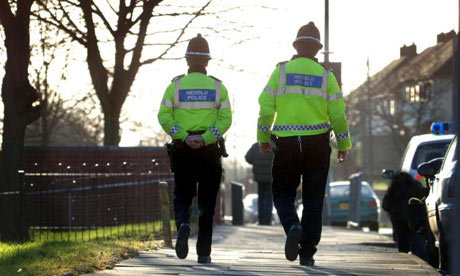 |
| PCC Alun Michael has launched his strategic Police & Crime Reduction Plan. (Pic : The Guardian) |
This was the post that did its best to never get posted. This was originally for back in March, but I had to delay it due to the reshuffle interruption, then I pushed it back because of the local government blogs. I was ready and set to post it yesterday, but obviously "events" overtook it.
Anyway, one of the main roles of a Police and Crime Commissioner (PCC) is to produce a plan covering the strategic direction of policing. I bet you forgot we even had one, didn't you?
Well, we do, and following his election as PCC for South Wales last November, in the last few weeks, Labour's Alun Michael published his strategic plan for policing until March 2017.
South Wales Police : An Overview
South Wales Police (SWP), headquartered in Bridgend, are the police force serving : Cardiff, Swansea, Bridgend, Vale of Glamorgan, Rhondda Cynon Taf, Neath Port Talbot and Merthyr Tydfil. It's Wales' largest police force, with 42% of Wales' population and 47% of Wales' recorded crime under its jurisdiction.
It's said crime in South Wales is "at its lowest level since 1983", with a 4.5% drop in recorded crime between 2011 and 2012. There was also a 38% fall in anti-social behaviour between April and December 2012.
The overall long-term crime trends have been downward since mid-2008, and the detection rate (solved crimes) has risen from 25% in January 2008 to around 31-32% in September 2012. The satisfaction of victims of crime has also risen quite dramatically, from 68.9% in mid-2007 to 91.4% in November 2012.
Alun Michael's Priorities
The PCC says he wants to be "tough on crime and the causes of crime." He sets out 13 strategic priorities, which could be grouped and summarised as:
Crime reduction - The PCC wants to take a "partnership approach by focusing on what works". He specifically wants to focus on drug and alcohol related crime, and would like to take an "evidence based approach" to understand what effect they have on communities.
The PCC "has concerns" about weakening ASBOs, which he believes are "successful and efficient". He says he'll work with "whatever tools are available", "work with partners" etc. He specifically wants the public to see that the police actually deal with anti-social behaviour and take complaints seriously.
The PCC specifically wants to tackle things like people trafficking and sexual violence, calling this a "top priority." He name checks former Local Government & Communities Minister Carl Sargeant (Lab, Alyn & Deeside) as someone he'll work with on this. I guess that's Huw Lewis now (Lab, Merthyr Tydfil & Rhymney). The Welsh Government are also working on a Violence Against Women Bill.
He'll take "full account of national and international threats" like terrorism, civil emergencies, organised crime and large-scale public order offences.
He (rightly) notes online crime as an increasing problem. He wants to take a "partnership approach" to tackle things like online bullying/abuse and child abuse. He wants to promote South Wales Police's own initiatives to tackle online abuse.
Restorative justice and reducing re-offending rates - He wants to promote restorative justice techniques to reduce re offending, which is already being used by South Wales Police, something he "applauds." He also wants to work closely with various criminal justice boards on the issue.
The PCC wants to support early intervention programmes on youth offending. He wants to work with prisons, local authorities and the probation service (or what will be left of it) to "break the cycle of crime" within the 18-25 age group. He also wants to study the impact of programmes where offenders "face up to the impact on victims."
 |
| Online abuse and crime is said to be a growing problem and is another of Alun's priority areas. (Pic : techliberation.com) |
Again, he wants to "work with partner agencies" like the NHS and universities to monitor things like violent crime and its links with drugs and alcohol. He specifically cites the approach taken in Cardiff as an example he wants to apply across South Wales.
Supporting victims - He wants to be "more open and accountable to victims" and make the police more "victim focused." He would like to ensure people don't become victims of crime in the first place. He also wants to work closely with Victim Support, Women's Aid and the Welsh Government to do all this. Partnership approach etc.
Communication with the public – The first proper party political statements make their way in, as the PCC notes "draconian cuts" to front-desk policing roles. He does, however, say it was "the right decision" based on evidence. He cites PCSOs as a good way to bridge the gap, something that the Welsh Government have been pursuing. He says he wants to avoid using jargon to enable himself to communicate clearly with the public. What, no "partnership approach"? No "frameworks"?
Equality and diversity – He's impressed by South Wales Police's commitment to equality and diversity and wants to ensure that policing continues to be delivered "fairly and without prejudice or discrimination." This includes a commitment to improving Welsh language services.
Police Finances
The PCC raised the policing precept by 7% - which came into force this month – justified because of, as he puts it, "a £25million disadvantage" due to cuts in direct Westminster fund to police forces, as well as uncertainty over smaller funding streams like grants. Cuts are "too deep, too fast" yadda, yadda, yadda. He againt notes the Welsh Government's commitment to extra PCSOs.
He says South Wales Police lost out on a cumulative £141million of investment, due to a "legacy of obsolete buildings and equipment" as well as "high risk" capital expenditure on things like the new Cardiff Bay police station.
If he hadn't raised the precept in line with other Welsh police forces, then he estimates that alone would've resulted in a £15million "funding inequity". Added to various other things, the "cumulative disadvantage" would've been just over £31million per year.
Despite the sharp rise to the Band D precept – set at £181.28 - the South Wales precept remains the lowest of the four Welsh police forces.
Overall impressions
 |
| The Welsh Government have their own commitment to provide extra PCSOs, and it seems as if the PCC is keener to work with Labour in Cardiff than the coalition in London. (Pic : Safer Bridgend) |
Specific targets weren't included in the document as they were still being drawn up at the time. Judging by the general trends, noted further up, I don't think we can expect anything dramatic.
I think Alun Michael will be quite happy to let South Wales Police keep doing whatever it is they're doing as long as crime rates continue to fall and detection rates rise. It'll be re-offending rates that I'd imagine will be the key focus, as well as specific issues he's highlighted as important like violence against women.
There's not much else to note, not that the proposals aren't fine by themselves. A Police and Crime Commissioner wants to reduce crime and re offending - shock, horror! It's not as if any PCC is going to go into the job saying they want to turn their respective force area into Mogadishu, are they? Or legalise drugs? Or bring back corporal punishment?
Many of the things mentioned aren't particularly original, and the position of PCC doesn't seem to have much clout. It's as though the PCC is just doing part of the job you would've expected Chief Constables to do. At least there's more accountability now, I'll say that.











0 comments:
Post a Comment